Tim Moore: My 6,000-mile road trip through the Trump heartland... in a 93-year-old Ford Model T
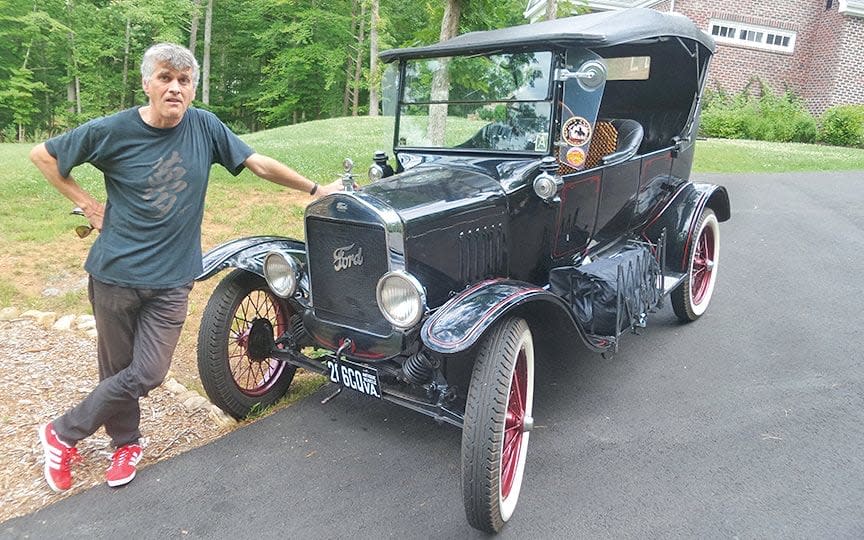
By noon on the last day of August, eight weeks after I’d set off from the Atlantic coast, the sizeable town of Bend, Oregon, lay in sight: just west of it my map’s base layer turned from sandy beige to forest green, and thence to ocean blue. I’d never managed more than 250 miles in a day before, but this was surely the day to do it.
Come sunset I’d have my front wheels in the Pacific. Hollow disbelief set in. I had somehow traversed this giant nation from sea to shining sea, up to the Canadian border, down to the Gulf of Mexico, over the Rocky Mountains and the Continental Divide, and I had done it in a 93-year-old car christened Mike with a lawnmower carburettor.
Except I hadn’t, because two miles outside Bend, the crankshaft broke.
‘Now there’s one club you don’t want to join, Teeum, and that’s the two-piece crank club.’ Every T guy I’d met had spoken of this mother of all breakdowns, sometimes in a tone of jaunty bravado, more often with murmured dread. A bust crankshaft was a game-over grand slam, the Component Failure That Must Not Be Named. The crank converts up-and-down piston movement into a more useful rotational force, a procedure that requires an eccentrically crenellated metal casting of obvious vulnerability.
Henry Ford’s team designed a car that farmers could fix by the roadside, but a broken crank was the T’s Achilles heel. No one could sort that on a hard shoulder. Few bothered to sort it at all: replacing a crankshaft meant a full engine-out rebuild that very rarely made economic sense.
‘How will I know if the crank breaks?’ I remembered asking a mechanic back in Ohio. ‘Oh, you’ll know,’ he’d replied, with a mirthless laugh. Well, he was right. A muffled, heavy-metal explosion shook Mike’s front end, a flagrantly terminal cataclysm that begat an instant and total loss of power and a death-drone into the sandy verge. An electrical substation beside me buzzed fitfully. What a crushingly banal backdrop for our great adventure’s final act.
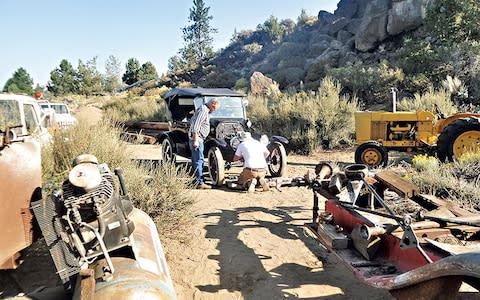
I sat with both hands on the wheel, my features crumpled into something pitiful and wet. Over the years I’d set off on umpteen under-prepared, overambitious journeys, none of which I deserved to complete but all of which I somehow had. At last, my luck had run out. This was the reckoning. ‘End of the road, Mike,’ I managed to croak. At least he’d got me across the Great Sandy Desert, I thought, and pondering this heroic final gesture had me off again.
‘Howdy. All good here?’
I composed myself, looked up and met a sunny old face. ‘Not really.’ My attempt at a manly sniff had way too much mucus in it. ‘Broken crankshaft.’
‘Holy mackerel,’ said the face, looking almost impressed. A smile and a teasing pause. ‘Thing is, I’m a Model A guy, and I’m pretty sure my mechanic knows his way round a Model T. Want me to go get him?’
If you break it, they will come. Don Penington was back an hour later with his fixer, Mike Stenkamp, and a little packed lunch his wife had prepared for me. It was all extremely touching.
They lashed Car-Mike to the back of Man-Mike’s old Land Cruiser, then hauled me around Bend’s deserty hinterland at terrific speed, which in combination with a three-foot tow rope and my negligible brakes made for quite an adventure.
Hunkered up against a low, Flintstones-bouldered bluff, Man-Mike’s industrially proportioned workshop was an uncharacteristic shambles, bestrewn with tools, dismembered engines and dusty radio equipment. There wasn’t room for even an emaciated Model T in there, so we got to work outside on the sand, amidst a sprawl of old tractors and unfinished projects sitting bonnet-deep in weeds.
There it was: a clean break through thick grey metal: I’d joined the two-piece club. The one chink in Mike’s armoury of measured calm was a toneless cackle that irresistibly recalled Robert De Niro in psycho-gangster mode. ‘Well, I guess all my other work just went out the window.’
These were the words that launched my journey’s most extraordinary repair experience, its crowning overhaul, the Daddy Fix against which all others would be judged and found wanting. It wasn’t quick. It wasn’t cheap. But it would never have happened at all, not for love nor money, without the benevolence, comradeship and boundless practicality of the men and wives of the High Desert Model A club.
‘This man set off across the whole country in a Model T he’d never seen before, by himself, never knowing what might happen around the next corner.’ Ron Alley clamped a meaty old hand to my shoulder and gazed around the Black Bear Diner in Madras, where 28 members of the club sat in silence before their breakfasts. ‘Gentlemen, I say he’s got two sets of balls.’
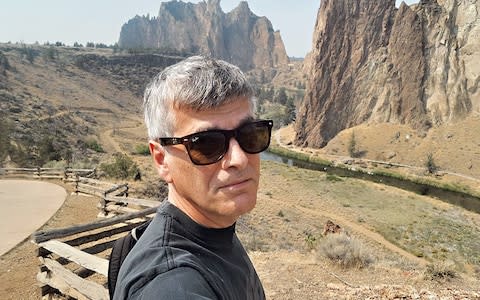
These were humbling words indeed from a man hardly under-endowed in the metaphorical trouser department. Ron was 85 and a fix-all force of nature. He’d been knocked off his feet twice while masterminding my engine extraction, but had leapt straight back up both times, and finished the operation with blood coursing down his left forearm. At his bidding I now stood and looked out at a sea of checked shirts and hearing aids, topped with a bobbing layer of trucker caps.
‘That’s extremely kind, Ron, but I don’t really have any balls at all.’ Murmurs, a shifting seat, then a voice from the rear. ‘Can’t hear ya, buddy.’
‘I have no balls,’ I announced, more firmly. ‘In fact, I’m here to kind of borrow yours, in a way, because I’m hoping that one of you might, um, have a spare, ah…’
Ron had heard enough. ‘God dammit, man needs a crankshaft, 10/10 ground undersize for a Model T.’
Later, we returned to Mike’s car, and set off on a crankshaft hunt that took us deep into the gravel-paved, high-desert outback, at the tail of a convoy led by Ron in the Model A pickup that had been his since 1947. The day unfolded like the tale of Redneck Cinderella, as Mike knelt before a succession of rusty crankshafts, micrometer screw gauge in hand, on a quest to find The One.
Give an old car guy a barn and he’ll never throw anything away. Men who’d never even owned a Model T would dig out a couple of old cranks for us from some spidery fundament. But we were looking for a needle in a haystack, almost literally. The moving parts in my engine had become married together in a very bespoke fashion during their 93-year partnership, and I needed a crankshaft whose business surfaces were precisely 10 thousandths of an inch below their factory-fresh girth.
Tom had a lovely blue Hudson and a container full of Ts, but his spare crank was too big. Dave showed us through four cavernous outbuildings piled with Model Ts, traction engines, pianos, bicycles, hurricane lamps and church bells, but none of the dozen-odd cranks he hauled out were quite the right size. And so it went on until we arrived at a neat farmhouse fronted by a municipal-grade circular flower bed, at the centre of which sat the oxidised wreck of a Model T tourer.
Chuck, owner of 11 functioning Ts, presented his spare crank with a confident flourish. Its appealing gleam set it apart from its scabby orange predecessors. Mike clamped his micrometer around bits of glinting steel with an air of focused portent. After a while he stood up, removed his tinted spectacles and murmured, ‘That’ll work.’
Installing this miracle to Mike’s exacting standards would require a solid week of toil. So I hired a car, booked into the cheapest motel I could find and spent many happy, idle days honing an appreciation of Bend and its environs. The landscape of Greater Bend had seemed unarrestingly flat and sandy as I’d tootled around it in Don’s Jeep, but a fistful of brochures from the motel reception directed me to scenes of breathtaking grandeur that would be national attractions in any other country.
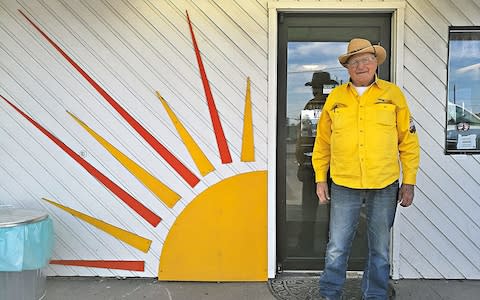
Rivers hurled themselves off pine-clad bluffs and meandered through mighty canyons. Five-hundred-foot outcrops sprouted from the desert plain, like flint hand tools cast aside by some caveman deity. The region’s volcanic legacies ran through the full and fabulous spectrum: sprawling lava fields, lofty cinder cones, craters filled with glassy lakes and a whole mountain built entirely of lustrous black obsidian. It was like driving through a full-colour anthology of Ansel Adams’s boldest photographic landscapes. Then I’d go back to a bleak and careworn motel room, flick a Bakelite switch and trudge into an Edward Hopper.
One night the wind changed and the smoke from the nearby wildfires blew in. By dawn there weren’t any sights to see, so I spent a weekend wandering around the town centre, watching haze redden the sun. Downtown Bend was strikingly different from all the rundown, depopulated Trump-belt towns I’d passed through. It was prosperous and pretty, the old streets thoughtfully re-gentrified, their sidewalks lined with espresso bars and day spas, the art deco movie theatre reinvented as ‘a hub for culture, connections, and artistic experiences’.
A gift shop, handily encapsulating the mood, displayed a sign advertising ‘Up-Cycled Copper Cool Stuff’. Many of the craft-ale taverns had gardens that stretched down to a curve in the Deschutes River – the very meander that had given Bend its splendidly half-arsed name. There were skateboarders, marijuana dispensaries, even a bike-sharing scheme: every trapping, in short, of a liberal metropolitan lifestyle I hadn’t expected to encounter this far inland.
My old boys had given me the skinny. Bend’s recent surge in wealth and size was down to an influx of Californians, lured north by cheaper real estate and a familiar climate. They’d brought along their lifestyle and values, and turned central Bend into a dab of Democrat blue amid the Central Oregon redlands. In an act of charity that I might thank him for one day, Car-Mike had stranded me on the front line of the great American culture war.
‘We don’t really go downtown these days,’ Don told me. ‘Too expensive, not our people, not our place.’ It was a never-the-twain divide, cowboy v liberal, Prius v pickup, Bud Light v IPA. Don was a folksy, genial fellow, a dialled-down Jimmy Stewart who said things like ‘You bet!’ and ‘Gee willickers!’– without question the loveliest person you’ll ever meet with a TRUMP–PENCE sticker on his rear windshield.
Everyone I met out in Bend’s ‘howdy belt’ was a committed Republican. The solitary exception: a Model A collector who’d moved in from the West Coast a few years previously, and was universally ribbed as ‘the Democrat’. The rest chuntered mildly about damn pot shops, about ‘Kim Pong Poo’, about Oregon’s openly bisexual governor (‘Guess she stands a 100 per cent chance of getting a date on Friday night’). Everyone’s car radio was tuned to Fox News.
Yet my boys weren’t natural Trumpites as I’d come to know them. There was no bitterness or desperation. Nobody mentioned an impending apocalypse. I didn’t see a single gun, though I’m sure most of them had one. These men had worked hard in largely humble careers – erecting electrical signs, managing auto-spares shops, um, machining bullets – and were enjoying comfortable retirements focused on mechanical pottering. It was just that those carefree final chapters had been abruptly defaced by a bewildering invasion of urbanite liberals, and the weird West Coast shit they’d transplanted out in the Great Sandy Desert: the bike lanes and jogging, the quinoa and gender fluidity and up-cycled copper cool stuff.
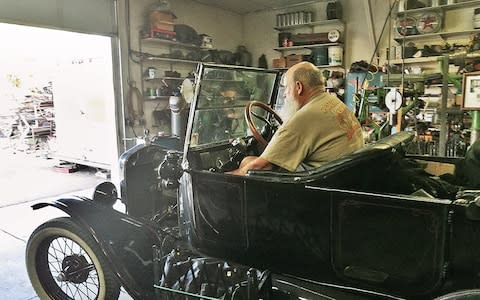
Bend had been Californicated, and my mild-mannered traditionalists found themselves under siege in their own town, their way of life mocked and marginalised. ‘They think we’re all dinosaurs and racists,’ Ron told me. It was people like him whose toil and determination had brought Bend to life; now they were outcasts, banished to the boondocks by snowflake software engineers and baristas who’d never got their hands dirty or known a world without air con. Their Bend was broken.
If one single factor had propelled these old boys Trump-wards in the election campaign, it wasn’t anything he’d said, but something Hillary Clinton had. In dumping half of Trump’s supporters in a ‘basket of deplorables’, she inadvertently confirmed a suspicion that held right across white Middle America: that the Democratic establishment wasn’t just ignoring them, it actively despised them. That single phrase must have seemed a perfect articulation of their resentment, of the chasm of mutual mistrust and loathing that separated city folk from their country cousins. A Millwall FC mentality kicked in: no one likes us, we don’t care. To hell with Hillary. To hell with everything. Vote Trump.
Man-Mike had left town to go to a funeral; Car-Mike stood where we’d left him late the night before, squeezed into a sliver of cleared floor space just inside the workshop’s roll-up door. What a fight he’d put up that day. It had taken five of us as many hours to force-feed the reassembled engine back through his pursed lips.
At the halfway point, it had transpired through a series of faltering admissions that nobody present had ever performed such an operation on a Model T, or for that matter done much of anything else to one. In the end we’d literally stretched Mike on the rack, heaving his lower jaw forward with a massive winch.
After a bolt dropped into the transmission, we had to extract it under the guidance of a 1920s service manual, and the busy little men in baker-boy caps and bib overalls who graced its illustrations. That was another two hours right there. And all the while that angry red sun bore down, sapping the will, lubricating palms, audibly buckling the derelict tractors strewn about in the sand.
When the whole procedure was ostensibly completed, we had failed to find homes for a good two dozen bolts, pins and springs. Nobody could even remember removing the five dice-sized cubes of wood that also wound up in our leftover tray. (A sixth fell to the floor when I pulled my trousers down that night.) As the day had worn on, people had kept dropping things, tripping, repeating themselves. There were moments, I confess, when I’d said a silent prayer for these old fellers just to hold it all together for long enough to get me back on the road. It felt as if a century of practical know-how, an entire folk memory of fixes, was draining away into the sand beneath us. ‘I’ve got four daughters,’ Chuck had said, ‘and not one of their husbands knows one end of a hammer from the other.’ These self-taught ninja mechanics, working by eye to a thousandth of an inch, fixing con rods with bacon rind, were the T era’s last samurai.
For long days the Model T keys had clinked uselessly in my pocket. Now, on my 10th morning in Deschutes County, I slipped them in the ignition, started Mike up and reversed out into the sun. Fordus interruptus was at an end. My first mission: to follow Ron back to the house he shared with his wife Marlene in Culver, some 40 miles away up US 97, where at his insistence I’d been accommodated for three days.
‘See, I’d rather you spent money on the motor than giving it to some motel guy,’ he’d said. Ron had been my wallet’s moral compass in Deschutes County, always on hand to put a fair price on the extraordinary mechanical favours that were being dispensed, and by men who batted away all offers of payment. ‘You’re only coming through here once in your life, Tim, so you want to be remembered right.’ Even then, avoiding an awkward scene had meant surreptitiously stuffing wads of banknotes into tool chests, and leaving cryptic clues in thank-you notes.
Taking the juddery, wandering wheel after such a prolonged break, I was awed all over again by my endeavour’s suicidal irresponsibility. When we stopped off en route at T expert Tom’s place to have my transmission bands adjusted, even he expressed reservations. ‘Just watching you drive in there, your car’s looking all caddywhompus on the left side.’ (I immediately banked this appealing idiom, cataloguing it beside Mike’s related catchphrase: ‘Like a saddle on a sow.’)
Ron’s house, a long bungalow perched atop a thousand-foot cleft in the Crooked River, was the extraordinary home of an extraordinary man. No matter how early I got up, Ron beat me. I once stumbled out of the spare room for a pee at 4.45am and there he was on his exercise bike out in the hall, in jeans, vest and a Stetson. ‘Got to hit the ground running,’ he puffed. ‘Who are you ripping off if you sleep in?’ Later he told me he’d never been in bed later than 5am in his whole life.
Somehow Ron sustained this restless intensity all day, driving me back and forth to Mike’s workshop, an 80-mile round trip, attacking my car with spanners, hammers and an arc welder, terminating any snatch of downtime with a clap of his hands and the words: ‘Come on, we’re burning daylight here.’ When the day was done, he drove Marlene and me down to the Round Butte Inn in Culver, nodded at three guys who seemed to live on their bar stools, and ordered us burgers and iced tea. Back home, I’d leave Ron and Marlene chatting in their parlour and weave wearily off to the guest room. ‘Don’t let the bedbugs bite,’ Marlene would call out. Her eyes were failing, and she spent a lot of time out in the yard, weeding by feel.
Ron talked from dawn to dusk, a stream of reminiscence and philosophy delivered with a playful glint in his eye and a ready chuckle. Every chapter began with the same three words. ‘Well, so, anyways, when I was a boy I rode to school bareback, one day the damn horse bucked me off and fell on my leg, and when he gets up, he-he, my damn foot’s pointing backwards…’ ‘Well, so, anyways, the government wants us all to live in cities so they can control us… I don’t need to go to no church, I don’t need to confess to no sins, I don’t commit any damn sins.’
Only two topics dulled that playful glint. The first was ‘the year Jimmy Carter stole the farm’, which Ron brought up at least three times a day. In 1981, undone by spiralling interest rates and a huge tax bill, Ron had lost the 990 acres of corn and ranch land that he’d been working all his life. At the age of 49 he’d had to start all over again. Luckily, he was Ron, which allowed him to pick up two burnt-out bulldozers at a salvage auction, rebuild them single-handedly in six weeks flat, and start up a construction business that soon prospered. But the trauma still haunted him, and surely informed his hatred for politicians of all stripes.
The second topic cropped up after we drove past a farmhouse a mile from his own. ‘One of my sons lives there, but we don’t see him no more because of his wife.’ I tuned out as Ron described the humdrum background to this longstanding feud, and was brought up short when he moved on to its rather more dramatic recent developments.
‘Well, so, anyways, she comes at me with the tractor, and I somehow get caught up in the rake behind it, and she’s dragged me around her property a while.’ Ron lifted a finger off the wheel to salute a passing pickup, whose driver responded in kind. ‘Then she comes round to my property, and, well, I never did point the rifle at her, just kind of had the barrel resting on my arm, but of course she gets the authorities involved and now I’ve got a court case coming up.’ He shook his head. ‘You just can’t pick your relatives.’
Well, so, anyways, we backed the T into Ron’s workshop and embarked on our final remedial fiddles, tightening bolts and checking fluids. I went off to collect my bags from the guest bedroom, and when I emerged a small farewell T party had gathered outside the workshop doors. All were familiar faces from that Cinderella crankshaft hunt: Jim, who’d bolted the back end of a boat to his Tin Lizzie and dubbed it the T-Tanic; Dave, he of the pianos and church bells; and Dennis, who’d driven them all here in his favourite T, a shabby-chic roadster whose grill-mounted Ford logo had been tweaked to read ‘Turd’. When Jim asked if they could take my car for a quick trial run before I set off, I readily agreed, hoping at the very least to have Mike’s caddywhompus-ness assessed.
Ron drew up a couple of plastic chairs and we sat down in the workshop’s threshold. ‘Funny,’ I said, watching Mike disappear over a sandy brow, ‘but that’s the first time in almost 6,000 miles that car has driven anywhere without me in it.’
The workshop phone rang. Ron went in to answer it, and took a while to reappear. When he did he was bearing a 24-can slab of Bud Light: an unexpected burden, as I had never seen him near alcohol. He popped open a can and placed it firmly in my hand. ‘That was Jim on the phone,’ he said. ‘Well, so, anyways, your car’s on fire.’
Half an hour later Mike appeared on the back of a tow truck driven by Ron’s nephew Randy. Three wide-eyed men described their ordeal in tones of disbelief as we winched Mike down to earth. They’d just pulled off the road to make a U-turn when smoke had poured out of the dash, followed by fingers of flame. Experience and quick-thinking spared a more total disaster: the two-gallon jerrycan of fuel and all my other kit were flung out of the back, the rear floorboards yanked up, the battery beneath swiftly disconnected. Had this conflagration occurred on my watch, I would have legged it and watched everything go up in flames.
Relief was tempered, however, by what we saw with the bonnet up. Mike’s entire wiring system had been reduced to carbonised spaghetti. I tried very hard to greet this discovery with stoic restraint, but clearly failed.
‘Why, see, Tim, I’m gonna have to chew up your rectum a little here.’ Oh, go on then, Ron. Just a nibble between friends. ‘You take it too hard when things go wrong, and get too excited when they go well. You need to accept that if you keep your head, things will just kind of work out.’
For a wild moment I wondered if this was all some crazy plot, the first act in a catalogue of sabotage that would detain their bumbling pet Englishman in Deschutes County for ever. It wasn’t such a huge stretch to picture Ron going full Misery on my kneecaps with a pipe wrench.
‘See, nobody wants to bust a crankshaft, but you bust yours in the only place this side of the Rockies where someone had a right-size spare.’ Ron nodded sagely. ‘And boy, you’ve been lucky again, because the guy who makes the best vintage wiring looms in the whole damn country is a personal friend, and he’s right down the road in Bend.’
How right Ron was. In the event, Mike was resurrected in 24 hours.
The farewells were long and fond. Don Penington, whose compassion had inaugurated this two-week festival of resourcefulness and the human spirit, turned up with his wife Karen, a sprightly presence with the poise of a retired tennis professional. She handed me another ration pack full of trail mix and cookies; he placed a souvenir torque wrench on Mike’s back seat. With a crooked smile, Jim wedged a fire extinguisher beside it. Marlene gave me a maternal hug; I placed a hand on Ron’s substantial shoulder. ‘On the back leg now,’ he said, with that twinkle on full beam. ‘You’re all but done.’ What a great country for old men.
As the sun dipped towards the vast conical bulk of Mount Jefferson, on show at last after so many days skulking in the smoke, Dennis made an extraordinary last-ditch offer. The road out of Culver was unusually lonesome; he had a cabin 30 miles west, and off we went, in a cloud of waves and desert dust.
With his burnished bare pate and Birdseye beard, Dennis was a distinctive face in the Deschutes old-car scene, and had a manner to match. He opened beer bottles in the slot of Turd’s spark lever, and kept a bottle of Tabasco in a holster on his belt (swoon). Dennis had been raised in California, and communicated in sharp, fluent bursts, a Tigger amongst the drawling Eeyores.
When the road threw us down the canyon I’d spent so many days on top of, I burst out laughing at the extraordinary spectacle, and its contrast with our puttering puniness: a violent, craggy plunge to a distant squiggle of blue, its upper flanks washed gold by the setting sun. Like all good things Dennis’s cabin was rude but cosy, alone in an outback plateau of pines and crispy brown grass, far from the piped and wired conveniences of modern life. ‘Careful when you sit down,’ he called out as I creaked open the outhouse door. ‘Pretty brave squirrel has set up home in the long-drop.’
We fired up a rusty barbecue, threw on some hotdogs, and opened a couple of beers. It warmed my heart to see the two cars side by side in the long grass, a companionable, twilit gleam in those wide-set eyes. The stars and moon were soon full frontal, and the tepid breeze took on a chill. It felt like the last night of summer.
‘Can I ask you honestly what people in Britain think about Trump?’
I drained my beer, the straight answer stuck in my throat. The faraway howl of a coyote drifted through the pine trees. I didn’t want to upset anyone. Particularly not right out here. A while earlier, admiring Turd’s many outboard luggage boxes, I’d asked Dennis what he kept in them. ‘Travelling light on this trip,’ he’d said, fixing me with a piercing blue gaze. ‘Just an axe and a shovel.’ Three extremely long seconds had elapsed before he collapsed in a fit of giggles.
But then I thought: Sod it. I’d bitten my lip for almost three months, and sometimes a man had to say what a man had to say.
‘Well, as you’re asking honestly, Dennis, I’d say that by general agreement in my country, Donald Trump is an embarrassing stain on the fabric of the universe.’
His fluffy white beard nodded slowly in the moonlight. ‘Now that’s a pretty bold statement to make in this part of the world,’ he said, and I waited for him to lean forward and slam an opened Tabasco bottle up my nose. ‘But it’s one that I happen to agree with.’
I guessed it was those formative years in California. And with that Dennis stood up, reluctant to dwell on the farcical tragedy that had befallen his nation, and marooned him amongst people who rejoiced in it.
Another Fine Mess: Across Trumpland in a Ford Model T, by Tim Moore (Yellow Jersey, £14.99), is published on 8 November. To order your copy for £12.99 plus p&p, call 0844-871 1514 or visit books.telegraph.co.uk
